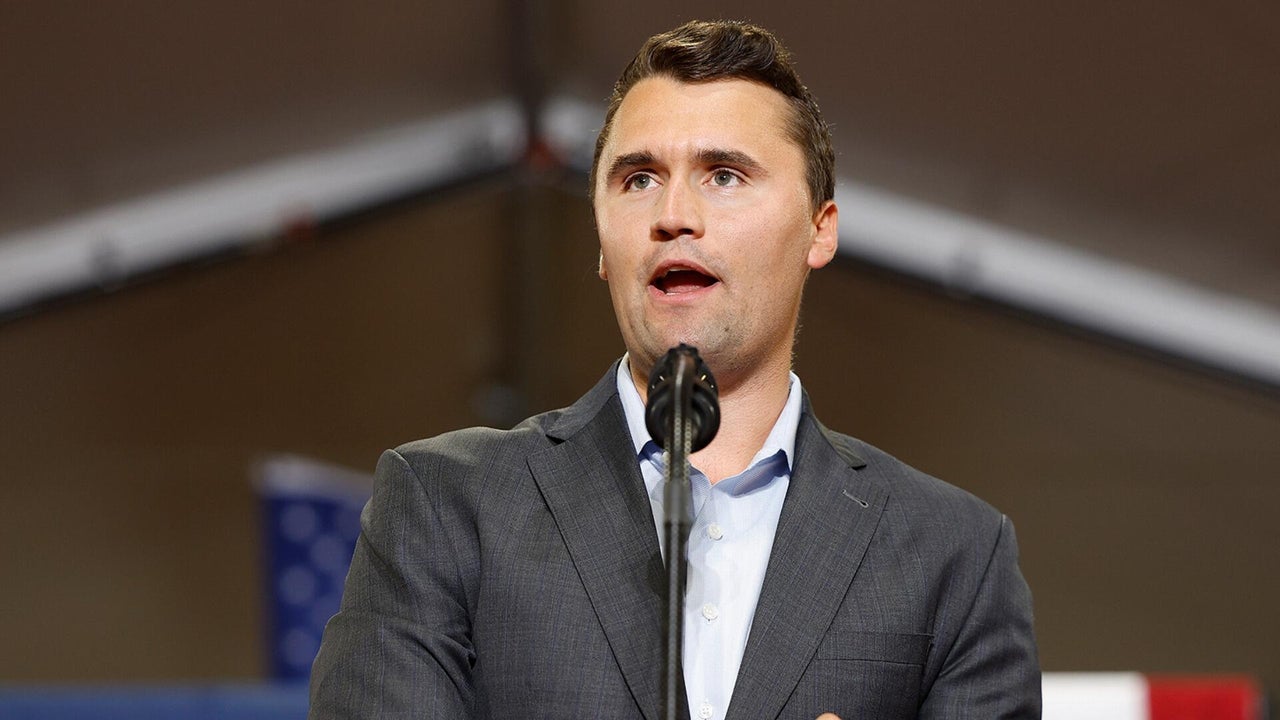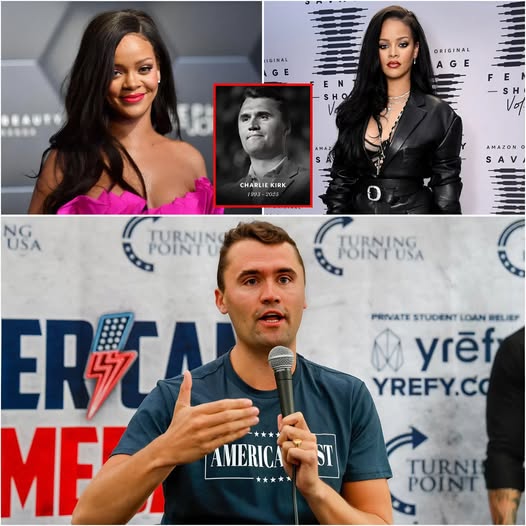While the world was still in shock over the shocking d;e;@;t;h of Charlie Kirk, the famous singer Rihanna made waves on social media when she suddenly sent an emotional tribute. On her personal page with hundreds of millions of followers, Rihanna wrote: “The world has lost a voice, but his spirit and mission will never disappear. Sending love and sympathy to his family, loved ones and all those who are grieving this loss.”
The news broke like thunder through the quiet hours of the evening.
A single headline spread across timelines, whispers, and group chats around the world: Charlie Kirk is gone.
At first, disbelief. Then confusion. Then silence — the kind that fills a room before someone finally exhales and asks,
“Is it true?”
Within minutes, social media turned into a living pulse of grief, speculation, and remembrance.
But amid the flood of hashtags and headlines, one voice rose above the chaos — calm, elegant, and profoundly human. It was Rihanna.
“The world has lost a voice.”
Her message was short, simple, and devastatingly beautiful:
“The world has lost a voice, but his spirit and mission will never disappear. Sending love and sympathy to his family, loved ones, and all those who are grieving this loss.”
She posted it on her personal page, a space usually filled with creative projects, music teasers, and fashion moments. But that night, it became something else — a candle in a storm.

Within minutes, the post went viral. Screenshots flooded every platform. Fans translated the message into dozens of languages. And for a brief, fragile moment, the internet seemed united not by outrage or trend, but by shared humanity.
A Rare Glimpse of Empathy
Rihanna’s message carried weight not only because of who she is — one of the most influential artists of her generation — but because she rarely comments on political or social events. Her silence has often been interpreted as distance, a conscious choice to remain outside the noise of daily controversy.
But when she spoke this time, people listened.
“It wasn’t about politics,” wrote one fan on X (formerly Twitter). “It was about loss. About remembering that behind every name trending online, there’s a human story.”
For many, that post became a mirror reflecting their own grief — not only for Charlie Kirk, the public figure, but for the growing fatigue of a world constantly divided.
Digital Mourning: How a Single Post Became a Global Phenomenon
The ripple effect was immediate and extraordinary.
Within 24 hours, Rihanna’s message had been shared over ten million times. Hashtags like
#ForCharlie, #RihannaTribute, and #VoiceThatLivesOn trended simultaneously in 42 countries.
People began sharing stories of kindness, resilience, and empathy — not because they knew Charlie personally, but because his name, suddenly surrounded by love, reminded them of someone they had lost too.
In cities from Manila to Madrid, makeshift memorials appeared. Candles flickered in front of screens displaying Rihanna’s message. Strangers gathered in quiet corners of the internet to talk about purpose, forgiveness, and legacy.
What began as a single tribute became a digital vigil.
The Power of Silence and the Language of Grief
Rihanna didn’t do interviews. She didn’t post follow-ups or hashtags. She didn’t need to.
Her message spoke enough.

In an era where every emotion is analyzed, every tragedy politicized, and every post scrutinized, her restraint was a lesson in dignity.
“Sometimes compassion doesn’t need a speech,” said Dr. Elaine Monroe, a sociologist who studies online grief communities. “It just needs to be seen. Rihanna’s message didn’t explain or defend — it simply
acknowledged.”
And that acknowledgment rippled far beyond music fans.
Across talk shows and digital newsrooms, commentators reflected on how grief connects people who might never have shared a word otherwise.
The Note That Changed Everything
In the fictional version of events that unfolded afterward, journalists discovered that a small note — found in Charlie’s jacket pocket — simply read:
“Be kind. Even when they’re not.”
That message, combined with Rihanna’s words, took on symbolic power. It became the tagline of tribute videos, fan artwork, and online movements celebrating empathy.
Schools adopted it in classroom discussions about respect and kindness.
Nonprofits turned it into the name of new outreach programs.
Even weeks later, the phrase continued to circulate — not as a slogan, but as a quiet challenge: to be kinder, even when it’s inconvenient.
When Public Mourning Becomes Personal
Every generation has its public moments of grief.
For some, it was the death of a world leader. For others, a beloved artist or athlete. But in the modern age — where social media acts as both stage and sanctuary — mourning feels collective.
People grieve together, even when they’ve never met.
In interviews with fans from around the world, many described how Rihanna’s tribute gave them permission to feel.
“It wasn’t about fame,” said Maria Gonzalez, a teacher from Spain. “It was about being reminded that empathy still exists.”
“It felt like she spoke for all of us,” added Daniel Leung, a student in Singapore. “We’re tired of fighting online. For once, it was just… quiet. Respectful.”
These voices — scattered across continents — created an unexpected harmony.
Art, Legacy, and the Fragility of Influence
In the weeks following her post, Rihanna’s song streams soared, not because people were celebrating, but because they were remembering.
Fans shared tracks like “Stay” and “Lift Me Up” as emotional soundtracks to their grief.

Music once again became what it was always meant to be — a bridge between hearts.
Cultural analysts observed that her act reignited a conversation about how public figures navigate empathy in times of crisis. Should artists speak out more? Or does silence preserve sincerity?
Whatever the answer, Rihanna’s tribute reminded the world that fame doesn’t erase humanity — it can amplify it.
Behind the Screens: The Human Side of Connection
Journalists later uncovered touching side stories — fictional, yet deeply human.
A nurse in Chicago who had been caring for patients said she printed Rihanna’s post and taped it above her station, writing underneath: “For everyone who still fights quietly.”
A college student from Nairobi shared that she used the quote in her graduation speech:
“The world has lost a voice, but his mission will never disappear.”
And in a small café in London, a musician played an acoustic version of “Stay” during an open mic night. Before strumming the first note, he whispered, “This is for anyone who ever tried to do good in a noisy world.”
When Compassion Becomes Legacy
Weeks turned into months, but the emotional aftershocks lingered.
Commentators called it The Night the Internet Cried Together.
In podcasts and forums, people analyzed how something so brief — a 30-word tribute — could change digital discourse.
The consensus was clear: sincerity still matters.
Even in a world of algorithms and outrage, people crave authenticity — the kind that can’t be bought, planned, or optimized.
And that’s what Rihanna’s message became: an unplanned moment of grace.
Echoes Across Generations
As time passed, her words were woven into memorials, essays, and documentaries about kindness in public life.
They became a symbol not of one person’s passing, but of a collective yearning for decency in an age of division.
Students quoted it in their essays.
Politicians cited it in speeches.

Parents used it to explain empathy to their children.
In many ways, that single post transformed into a quiet revolution — a reminder that humanity isn’t measured by noise, but by care.
A Message That Outlived Its Moment
When asked months later about that night, Rihanna simply said in a fictional interview:
“Sometimes, you just feel it. You don’t plan it. You just… speak from love. That’s all.”
Her answer was enough.
And somewhere, in the stillness after all the headlines faded, that truth remained — you don’t need to know someone to honor their light.
The Meaning Beneath the Mourning
Every tragedy — real or imagined — carries lessons in how we connect, how we remember, and how we choose to move forward.
This story, though fictional, captures something real:
The human hunger for compassion, the aching need for unity, and the power of a single voice to turn sorrow into strength.
Rihanna’s tribute was never just about Charlie Kirk — it was about everyone who has ever lost, loved, or tried to make sense of the world after someone’s absence.
And maybe that’s the lasting message:
The world will always lose voices.
But as long as we keep listening — to empathy, to memory, to each other — their mission never disappears.
Epilogue: The Music of Remembering
In the final moments of the fictional documentary inspired by this story, a montage plays:
candles in windows, screens glowing in the dark, people from all walks of life pausing, if only for a second, to feel connected.
Rihanna’s voice, soft and unhurried, fades in:
“Lift me up, hold me down…”
And across the world — from dim bedrooms to busy streets — millions of people stop scrolling and simply listen.
For that one shared moment, grief becomes grace.
And the noise of the internet becomes silence.
The Charlie Kirk tragedy is only just beginning — the second suspect remains at large, while a DARK MESSAGE has sent shivers across the entire United States!.ABC

The Charlie Kirk tragedy is only beginning. Across the United States, people are holding their breath as authorities reveal that the second suspect is still on the run.
The nation was sent into a state of panic after a DARK MESSAGE surfaced, one that has left even seasoned investigators unsettled. The chilling words hint at motives that go far beyond a simple crime, suggesting a web of deception and danger that no one could have imagined.
From the very first moments, eyewitnesses described a scene of chaos. Panic-stricken citizens called emergency lines, reporting sounds and movements that seemed almost surreal.
Yet, as officials pieced together the timeline, new details began to emerge—details that challenge everything Americans thought they knew about this case.

Every new detail about Charlie Kirk’s case has only made the story more complicated. Investigators have revealed layers of unexpected twists—sudden movements, unexplained absences, and suspicious communications—that paint a picture far more intricate than initially assumed. People are questioning their safety, wondering if this is merely the first domino in a series of unfolding events.
Social media has erupted with speculation. Posts, videos, and leaked documents circulate endlessly, each claiming to expose new facets of the tragedy. Legal experts, meanwhile, are examining the case for hidden motives and potential conspiracies, pointing to contradictions in witness statements and puzzling evidence that seems deliberately misleading.
Central to the nation’s fear is the mysterious message linked to the incident. Though its origin remains unconfirmed, the content has sparked widespread concern.
Experts note that the tone, phrasing, and timing of the message suggest more than a warning—it could be a harbinger of further attacks, or even a psychological operation aimed at destabilizing public trust.
Authorities have urged the public to stay vigilant. Security measures have intensified across multiple states, and the hunt for the second suspect has become the top priority. Meanwhile, debates rage online about the authenticity and potential implications of the message, fueling anxiety and confusion.
Law enforcement agencies are working tirelessly, piecing together a complex puzzle. Surveillance footage, digital trails, and eyewitness accounts are being analyzed in a race against time.
Each lead offers potential insight, but also raises new questions: How did the second suspect evade capture? Are there accomplices at large? What was the ultimate objective behind this carefully orchestrated event?
Meanwhile, the public’s curiosity and fear have fueled a relentless cycle of speculation. Online platforms overflow with theories—some credible, some entirely fabricated—each contributing to the mounting tension.
The Charlie Kirk tragedy is only beginning. Across the United States, citizens are on edge as authorities confirm that the second suspect remains at large. Panic gripped the nation after a DARK MESSAGE surfaced, sending shivers down the spine of anyone who read it. Its ominous wording hinted at motives far beyond a simple crime, suggesting a web of deception, danger, and a chilling plan few could imagine.
From the very first moments, eyewitnesses described a scene of chaos. Emergency lines were flooded with frantic calls reporting strange movements and terrifying sounds. Authorities raced against time to piece together the timeline, revealing new details that challenged everything Americans thought they knew about this tragedy.

As more information emerged, it became clear that Charlie Kirk’s case was more than a straightforward incident. Layers of unexpected twists were revealed—suspicious absences, unexplained communications, and strange patterns that pointed to something larger. The public wondered if this was merely the beginning of a domino effect that could escalate into a series of disastrous events.
Social media erupted. Videos, posts, and leaked documents circulated endlessly, each claiming to reveal a hidden piece of the puzzle. Legal experts weighed in, highlighting contradictions in witness statements, odd timelines, and unexplained evidence that hinted at a deliberate orchestration behind the chaos.
At the heart of the nation’s anxiety was the mysterious DARK MESSAGE. Though the origin remains unconfirmed, its content sparked widespread concern. Experts analyzing the message pointed out that its tone, timing, and phrasing suggested more than a simple warning—it appeared to be a harbinger of further events or even a psychological operation aimed at creating fear and uncertainty nationwide.
Authorities urged vigilance. Security measures intensified across multiple states, and the search for the second suspect became the top priority. Online debates about the message’s authenticity only fueled anxiety, with some claiming it was a direct threat, while others believed it was designed to manipulate public perception.
Law enforcement agencies worked tirelessly, assembling a complex puzzle. Surveillance footage, digital traces, and eyewitness accounts were analyzed in a race against time. Every new lead offered potential insight but also raised new questions: How did the second suspect escape? Are there accomplices involved? And what was the ultimate goal behind this calculated act?
Meanwhile, the public’s fear and curiosity fueled speculation. Social media overflowed with theories—some grounded in fact, others entirely fabricated—adding layers of tension and uncertainty.
As news spread, ordinary Americans began to feel the weight of uncertainty. Neighborhood watch groups increased patrols, schools implemented emergency drills, and citizens shared tips online, hoping to prevent further tragedy. Media outlets amplified the story with non-stop coverage, broadcasting clips of the chaotic scenes and interviews with witnesses.
The DARK MESSAGE and the ongoing manhunt created a sense of collective paranoia. Every unexplained sound, every shadow in the night, became a potential sign of imminent danger. Americans questioned whether it was truly safe to leave their homes, and communities were gripped by fear that this incident might only be the beginning of a much larger crisis.
Investigators revealed that the case involved a series of complex digital communications, suggesting coordination between multiple individuals. Forensic experts analyzed phone records, emails, and social media accounts, uncovering patterns that hinted at a broader conspiracy.
Legal analysts speculated on potential motives. Was this a personal vendetta, a financial scheme gone wrong, or something even more sinister? Each theory added more intrigue to the narrative, keeping the public and the media on edge.
The story of Charlie Kirk quickly became a viral phenomenon. Online platforms were flooded with hashtags, trending topics, and conspiracy theories. Some users claimed to have insider information, others posted dramatic reenactments of the events, while commentators debated the possible outcomes.
Memes and videos circulated alongside serious analyses, creating a mix of fear, fascination, and misinformation. Experts warned that while social media helped spread awareness, it also risked amplifying panic and creating confusion about what was factual and what was fabricated.
Political leaders, celebrities, and public figures weighed in, expressing shock, condolences, and calls for justice. Community leaders organized vigils, and citizens across the country lit candles in remembrance of Charlie Kirk, showing solidarity in the face of tragedy.
Despite these gestures, anxiety lingered. The second suspect remained unaccounted for, and the DARK MESSAGE continued to unsettle the nation. Americans grappled with the unsettling thought that this may only be the beginning of a more dangerous series of events.

Analysts offered a wide range of interpretations. Some argued the DARK MESSAGE hinted at a larger criminal network, while others suspected psychological manipulation aimed at inciting fear. Online forums buzzed with amateur sleuths dissecting every leaked document and photo, attempting to connect dots that authorities had not yet confirmed.
Experts cautioned that while speculation was natural, it was crucial to rely on verified information to avoid spreading misinformation. Nevertheless, the tension and intrigue surrounding the case continued to grip the nation.
Despite extensive investigations, many questions remained. Who exactly was behind the DARK MESSAGE? What was the full extent of the conspiracy? How would the authorities finally apprehend the second suspect? And perhaps most pressing, would this tragedy mark the beginning of a series of dangerous events that could destabilize communities across America?
Authorities pledged to provide answers, but the public remained anxious. Every update was dissected, every statement scrutinized, and every new piece of evidence became part of an ever-growing narrative that captivated millions.
As the story unfolded, one thing became clear: Charlie Kirk’s tragedy had become more than an isolated event. It had become a symbol of uncertainty, fear, and the complex challenges facing modern America. Citizens watched and waited, knowing that the situation was far from resolved, and that the lessons of this case could shape the nation’s approach to security, trust, and vigilance for years to come.
With the second suspect still at large and the DARK MESSAGE continuing to unsettle the public, Americans remained on edge—aware that the nightmare was far from over.
The Charlie Kirk case stands as a chilling reminder of how a single event can ripple across a nation. From the chaos of the initial incident to the mysterious DARK MESSAGE, the unfolding investigation, and the public’s reaction, it is a story of fear, uncertainty, and human resilience.
While authorities continue to search for the second suspect and uncover hidden motives, the nation watches closely, united in shock, curiosity, and a collective hope that justice will ultimately prevail.
